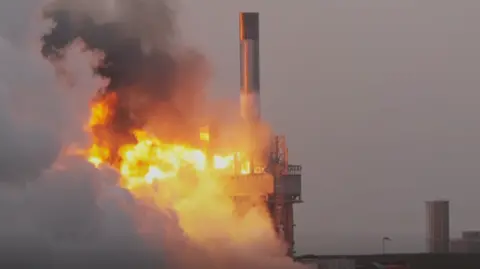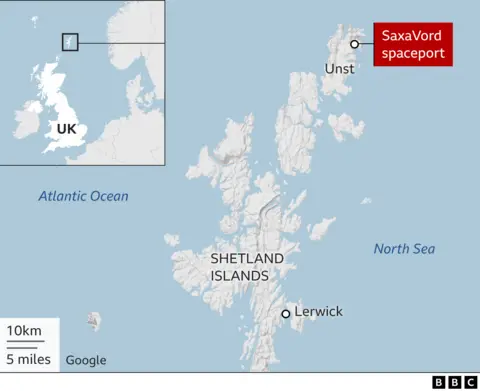A rocket launch from the UK’s new spaceport in Shetland has been delayed following a dramatic explosion.
The blast happened on Monday during a test by German company Rocket Factory Augsburg (RFA), who hope to eventually send the UK’s first vertical rocket into orbit.
RFA said eight out of a planned nine engines were ignited, but one developed an “anomaly”, resulting in a large fire and “extensive damage” to part of the structure.
The company have now released footage of the explosion on social media, saying their launch timeline within the next few weeks or months was “no longer possible”.
The scheduled nine-engine test was part of a number of trials due to be carried out before progressing to launch.
One of the engines caught fire and large flames and plumes of smoke could initially be seen shooting horizontally from the bottom of the rocket.
The entire structure was then engulfed by fire.
No-one was injured and the launch pad overall was saved.
SaxaVord Spaceport said all safety protocols were fully observed and the site was evacuated prior to the test, leaving no staff at risk.


RFA said the test had “worked fairly well” and that the explosion was likely caused from a fire in the oxygen pump which became difficult to contain.
It said it was likely that kerosene was being pushed out by the engine, fuelling the fire and leading to part of the structure collapsing.
In a video posted on X, formerly Twitter, a spokesperson for the company said: “The fire suppression systems… were simply not adequately sized to deal with this kind of damage.
“Unfortunately this has happened in that very important stage test and unfortunately this has taken out the entire stage.
“This comes at a really critical time – we wanted to launch within the next few weeks and months and this is unfortunately no longer possible.”
He added the collapse did not happened where it would have caused major damage on the launch site infrastructure and only certain areas would have to be rebuilt.
It was the “very first time” they had seen a fire of this nature and were confident it was not related to the design.
He added the company would attempt a launch as quickly as possible.


In December 2023, SaxaVord Spaceport was given approval from the Civil Aviation Authority to begin orbital launches this year.
It was to be the first fully-licensed spaceport in Western Europe able to launch vertically into orbit.
It permits up to 30 launches a year that will be used to take satellites and other payload into space.
German rocket firm HyImpulse and Edinburgh-based Skyrora are among the companies planning to use the spaceport.
Lockheed Martin/ABL Space Systems is also planning orbital launches as part of the official UK Government Pathfinder launch.
The space industry in the UK is estimated to be worth £17.5bn and supports about 48,800 jobs at 2,200 firms.
Cornwall Spaceport was the UK’s first licensed spaceport, however its rockets are launched horizontally, carried by an aircraft.
Scotland currently has five proposed spaceports under development, with the Sutherland Spaceport also under construction with ambitions of launching 12 rockets into orbit per year.
A further spaceport is planned on North Uist, with both Glasgow Prestwick and Spaceport Machrihanish hoping to join the space race and conduct horizontal orbital launches in the future.








